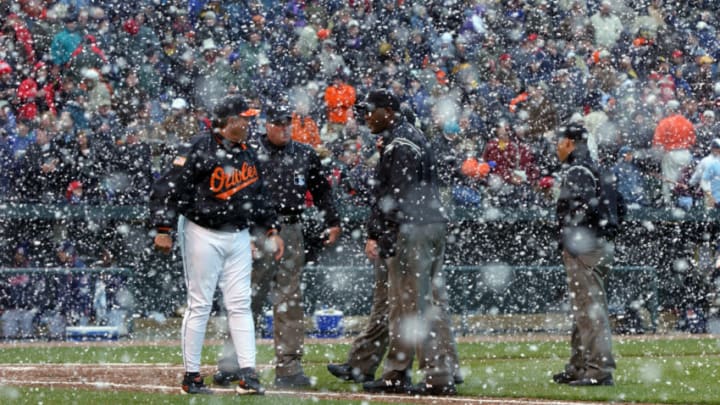As all eyes are focused on the 2017 World Series and the record-setting heat, Baltimore Orioles fans might remember back to the frigid temps that set records in 1979.
When the Baltimore Orioles faced the Pittsburgh Pirates, Game 1 was actually rescheduled due to an unbaseball-like wintry mix.
As the first pitch was thrown on Oct. 10, the temperature was the coldest ever recorded at the World Series: 41°F according to Baseball Reference.
An exciting game, despite the cold
Despite the cold weather and the constant rain, over 53,000 people attended the first game of the ’79 World Series at Memorial Stadium in Baltimore. And, they got a show. The Orioles scored five runs in the first inning and held the lead until the end. The Pirates chipped away but still ended up losing by one run.
Downtown LA may hit 104° today. World Series forecast first pitch temp = 99°. Would bust old heat record (94°) from Diamondbacks in 2001.
— Justin Bruce (@just1nbruce) October 24, 2017
In the first game in the bitter cold, Al Bumbry, Mark Belanger, Eddie Murray, John Lowenstein, and Doug DeCinces all scored runs in that first inning. Murray stole a base in the first inning. Bumbry his a sac fly. DeCinces hit a home run. Mike Flanagan pitched a complete game and struck out seven batters. There were six errors in the game with two committed by DeCinces.
More from Orioles History
- Baltimore Orioles: 2023 Hall of Fame BBWAA Ballot Features J.J. Hardy
- Baltimore Orioles: Five Treats from the 2022 Season
- Former Orioles Players on Playoff Teams this October
- On This Day: 2012 Ragtag Orioles Win Wild Card Game
- The April Orioles Seem Like a Completely Different Team
How long the record lasted
The chilly record remained until 1997 in the fourth game between the Florida Marlins and Cleveland Indians played. The temperature in Cleveland was 38°F when the game began, but wind chills were reported as 18°F. Imagine the big difference in playing in Miami, then traveling to frigid Cleveland.
How weather affects a baseball
Extreme weather conditions can affect the way that the baseball moves around the park. In the rain, it can be challenging for pitchers to get the grips they need to throw their various pitches. And, extreme winds can affect the way the ball flies out of the park. Anyone who has watched a Chicago Cubs game at Wrigley Field can attest to the power of the wind. Due to the proximity of the Wrigley to Lake Michigan, when the winds “blow out,” home runs can fly.
"Extreme temperatures can also affect the way the ball moves. According to Accuweather.com, heat will help the ball get out of the park. In an article by Kevin Byrne, he quoted University of Illinois physics professor Alan Nathan found “that a 10 degree Fahrenheit change in temperature will change the distance by something like 2.5 feet.”"
Cold and hot air can affect the grip for pitchers, too. Fortunately, the Los Angeles Dodgers and the Houston Astros players are used to hot temperatures, so they shouldn’t be affected by the heat in Los Angeles. There might be some sweaty hands on the mound, but nothing that affects the game in any significant way. But, when the Orioles and Pirates played in1979, the cold would have affected the hands of the pitchers.
Next: Adam Jones should win the '17 Heart & Hustle Award
Hopefully, the heat in Los Angeles and Houston will lead to some exciting baseball!
